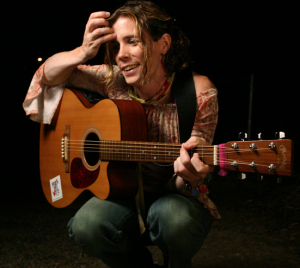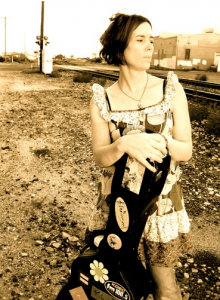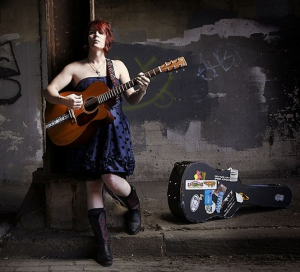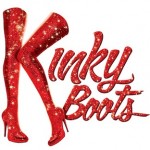Perpetual Change — TG Music: Namoli Brennet
Namoli Brennet is an artist who will probably be new to most TGForum readers. But — she’s definitely no novice. Based out of Tucson, AZ, Namoli has been touring extensively since releasing her first project, Boy In A Dress, in 2002.
Since that first recorded outing, she’s kept herself extremely busy, releasing a string of albums. Welcome To The Afterglow (2003); The Brighter Side Of Me (2004); Chrysanthemum (2005); Alive (2006); Singer Shine Your Light”(2007); Until From This Dream I Wake (2009); Black Crow (2010); with We Were Born To Rise in 2011. Last year, she released a live project, Namoli Brennet Live, which features performances that were recorded during shows at several different venues throughout the past year. A review of this newest project will be posted here soon.
Brennet started playing guitar at age 8. She has since then also picked up saxophone, piano, and drums. Along the way, she has played in more than one bar band, and has graduated college with a degree in music composition.
She is a four time Outmusic Award nominee, has won the Tucson Folk Festival Songwriting Award, and was a finalist in the ISC songwriting competition. Her music has also been featured on NPR, PBS, and as part of the sound track for the Emmy-award winning Out In The Silence
TGForum is honored to present this month’s featured artist, Namoli Brennet.
TGForum: You mention in your bio on your web site that your siblings were “golden voiced singers” and you hardly ever sang. Yet, you’re the one with the career. Was it shyness that kept you from singing in the beginning? What did it take to get over that?
Namoli Brennet: I don’t know if I would exactly call it shyness that kept me from singing — I think it was the terror of doing something poorly, of being laughed at or ridiculed. I had played a few different instruments, but something about singing is so vulnerable, and I can be incredibly self-critical. I think that even when I was a teenager I could easily talk myself out of trying something because I didn’t think I’d do it well enough, i.e. perfectly.
 TGF: How old were you when you started really dealing with your gender issues? I know you transitioned in your 20s, but how young were you when you realized something was, “different”?
TGF: How old were you when you started really dealing with your gender issues? I know you transitioned in your 20s, but how young were you when you realized something was, “different”?
NB: I don’t think I really had any concrete ideas about exactly why I was different until I was maybe 10 or 11. Up until then I played pretty much equally with boys and girls, which I think you can sort of get away with until a certain age, if you’re lucky. I knew something was different about me, but I had no idea what to call it and the only sense that I had was that it was weird, different, and probably wrong. (Did I mention I grew up Catholic?) I didn’t seriously start thinking about transitioning until my late 20s, and even then it was completely overwhelming. I was suffering with this crippling anxiety, which didn’t help matters. I was pretty much afraid that every decision I made would be the wrong decision, and it took a few years to lighten up enough to at least let myself try something. I think I was probably 32 when I started hormones.
TGF: It’s obvious from what you’ve written on your site that you don’t talk about being transgender during your shows. How do you handle it when it does come up, such as in interviews or with fans? Also, what kind of support did you get initially from family and friends? When you finally did to transition, do kyou feel it changed your music in any way?
NB: I do actually talk about being transgender at my shows-not necessarily every show, but if I feel it’s a receptive and safe environment where it would be a meaningful thing to bring up, then I will. I mean, my first CD was called Boy In A Dress, and if you Google me, I think the 5th or 6th result is women born transsexual or something. So being closeted is not and was never really an option. I had very mixed reactions when I transitioned. I was working at a church as music director, and it was a very public thing. I had people who, I’m guessing, thought it was disgusting and wrong; others who weren’t sure, and others who were 100% there for me. Thank goodness for them. And yeah, as far as music, I feel like creativity is really strongly tied up in who you are, so before I transitioned, I was this repressed person writing repressed music. You really can’t hide from this stuff, it starts to permeate every aspect of your life, and as an artist, it’s almost impossible to open up to yourself personally without opening to yourself creatively.
TGF: What were your musical influences growing up? What do you listen to now for your own enjoyment?
NB: I grew up in the ’80s, so I’ll always have a soft spot for ’80s bands. Not so much the hair bands or the pop, but I loved all the Indie stuff that was just coming out. The Smiths, The Cure, The Motels, The Pretenders — I guess pretty much any band that started with “the….”
These days, I spent a bunch of time in Bellingham, WA this winter listening to the French station out of Vancouver, B.C., and I heard so much stuff that I loved. I was obsessed with this band called Baden Baden, Marie Pierre-Arthur, Arianne Moffatt, Laurent Voulzy, all this music where I only understood a few words, but that still spoke to me, that was so interesting. It made me remember that so much of music is about the melody, the chords, and the sounds, the story sometimes figures in later.
 TGF: Folk artists have always had an audience, it seems. There’s been a recent surge in popularity of the genre because of band such as Mumford and Sons getting Grammy recognition. Has this helped independent artists such as yourself in any way? Has it changed audience response at all?
TGF: Folk artists have always had an audience, it seems. There’s been a recent surge in popularity of the genre because of band such as Mumford and Sons getting Grammy recognition. Has this helped independent artists such as yourself in any way? Has it changed audience response at all?
NB: You know, it’s really hard to say. I mean, to have a acoustic act win a Grammy, it definitely doesn’t hurt, that’s for sure. I mean, it might help, if more people are listening to acoustic music on Pandora, there’s more of a chance that I might pop up in someone’s playlist. And anytime there’s a trend towards listening to the kind of music you do, that’s probably got to be helpful in some way. But in general, I think that a lot of artists would agree that success in the music business is elusive. It’s hard to understand what works, what doesn’t, what helps, what hinders, what’s productive. Most of us don’t have managers, publicists, booking agents, so our ability to reach an audience has a lot to do with what we’re personally motivated or able to do.
TGF: Do you always perform solo? Ever consider putting a band together for touring purposes?
NB: I mostly perform solo. Part of that is just the reality of trying to make ends meet as a touring songwriter and part of it is that I like the way you can connect with the audience as a solo performer. I do love playing with other people, provided they’re the right people. I like musicians who are willing to play the song, and put aside their ego for what works best. I tend to like people with good instincts who hone inon that very quickly, and I do have a few people on both coasts and in different cities that I really love to play with when I get the chance.
TGF: It’s mentioned in your bio that you also play drums, piano, and sax. It’s also mentioned that you do play many of the instruments on your albums, but what I want to know is how often do you utilize other musicians in the studio on any given project?
NB: Up until this point, it’s been mostly me, which pretty much began out of necessity because Ihad no budget and then sort of became it’s own way of working. Over the years I’ve brought in cello players, brass, other drummers, the occasional guest vocalist, but yeah, it has been kind of this one-trans-woman show. My plan is to do something really different with the next CD. Kickstarter and crowd funding has dramatically changed the landscape in terms of what’s possible for an Indie artist and it makes it possible to dream a little bigger.
TGF: You’re currently working on your 9th album, correct? Is every previous release self-produced?
NB: (I need to update my bio!) I just finished my 10th CD, and I’m working on writing songs for my 11th. And yeah, so far every release has been self-produced and self released.
TGF: With the economy being what it is, how are independent artists such as yourself getting along?
NB: As far as the economy, I gave up my permanent address almost 2 years ago and have just been touring and staying on the road, so in some ways that makes things less complicated. In other ways, more — but as far as making a living, it cuts out a lot of overhead. Especially being a touring musician, where even if you have a house or apartment, you’re gone for probably 6 or 7 months out of the year.
TGF: You also function as a producer for other artists. This brings up some interesting thoughts. How do you decide on who to work with? Is producing something that you might want to seriously consider as a second career if you ever get tired of traveling as a solo performer?
NB: This is actually pretty simple. I only work with people whose music I like, because, as a producer or recording engineer or whatever, you have to be interested, engaged and excited about what’s happening. If I don’t feel like I can bring that into the room, then I’ll just say no thanks. I actually really like the recording process and I definitely wouldn’t mind doing more production work in the future.
TGF: What advice would you offer to any young performer, trans or not, who is just starting out?
NB: Great question. For any performer, I would say START PERFORMING, anywhere, and everywhere, because performing is it’s own art, and you only get to practice when you’re on stage, in front of people. The other thing is, it might take longer than you think. There’s this theory that it takes 10 years or 10,000 hours to get good at something, and I think there’s a lot of truth to that. Even people who seem like they got famout overnight, often you find out that they were at it for a long while before anything happened. It’s just that when they show up on your radar, that’s the beginning of you knowing who they are. So yeah, patience, start sooner than later, try not to listen to people who tell you you can’t , try to make good decisions and stay true to yourself.
Patti Smith said something in a talk. I’m paraphrasing, but it was basically that your name is your currency, and that if you do good and meaningful work, that your name will eventually be worth something. I think that’s great advice.
Check out Namoli’s website for more. CDs are available through CDBaby and Amazon.com. Namoli is also on Facebook, Twitter and Myspace, with videos posted on YouTube as well.
NEW MUSIC
It doesn’t look like Kinky Boots, the Musical shows any signs of shutting down soon. A new remix disc for the tune Land Of Lola from the show, featuring vocals by Billy Porter, has just been released. The disc contains the Anthem Remix and radio edit of the same remix. Remix produced by Wayne G and LFB. Very high energy mixes than not only will keep the show on the collective radar, but should be great competition for dance floor attention. Learn more on the Kinky Boots website.
Crickets by Drop City Yacht Club (featuring Jeremih)?
This is a remix disc of the Drop City Yacht Club’s single Crickets and features the original version along two instrumental tracks and 8 different mixes. Describing themselves as “finding a middle ground between The Beastie Boys and The Beach Boys,” the group consists of Kristo, A Wolf, and THX. Definite good-time stuff for the summer. For more information visit the band’s website. They’re also on Facebook, Twitter, and Instagram.
Introducing The Dame by Ivy Levan
Ivy Levan’s four song debut EP, Introducing The Dame is upfront rock. Definitely not what you’ll probably hear in a dance club. Nonetheless, I’ve decided to include it here because this dame really has a hard hitting rock voice and most definitely needs an introduction. Given her approach, though, one introduction is all she’ll need. A video for the tune Hot Damn from the EP is in-your-face material, affectionately known as “swamp-bop.” Levan will be on tour until the middle of this month. For tour dates and other information, check out her website and social media.
AND NOW FOR SOMETHING COMPLETELY DIFFERENT
Last month in our companion TransVocalizers column, I made mention of an the all girl band CSS from Brazil, and their newest release, Planta. Well, besides being a working band, the ladies of CSS have also been filming a a self-improvement make-over series that seeks to update the wardrobe, home decor, and diet of friends.” Webisode #3 in the continuing series has just been released. Check it out on YouTube, and also, the band’s website.
Category: Music





